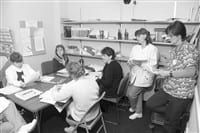Getting Everyone On The Same Page Holyoke Medical Center Programs Focus On Excellence And Efficiency Of Care
When patients are admitted to a hospital, the two main questions they probably have are: “How long will I have to be here?” and “How good will my overall care be?”
Two new programs at Holyoke Medical Center strive to ensure that hospital stays are only as long as necessary and that patients’ care is coordinated to provide both excellence and efficiency.
As part of the Holyoke Medical Center’s Institute of Healthcare Improvement (IHI) quality improvement initiative, two nursing units are using these programs with great results. The S3W unit, an acute medical/surgical unit, has implemented multi-disciplinary rounds to improve overall care, while S4 is focusing on discharge planning to ensure that patients and their families know how long the hospital stay will probably be, even before they are admitted.
“The main focus of multi-disciplinary rounds is to improve communication between everyone involved with a patient’s care, including the patients and their families,” said Cherelyn Roberts, clinical coordinator for S3W. “Whoever is participating in their care is invited to go on the rounds, so that everyone is on the same page everyday.”
For example, almost every patient eats and most will be taking some form of medicine during the stay, so someone from dietary and pharmacy departments will attend each round. If the patient will need physical therapy, then someone from that department will also accompany the group.
This allows on-the-spot communication between the various participants in a given patient’s care, and allows a coordinated flow of communication to both the attending physician and the next shift.
“The whole key is condensing communication,” Roberts said. “Goals are set on each round and passed onto the next shift. We can then make adjustments the next day based on these goals.
“If their meds or diet plans need adjusting,” she continued, “we can do it right there because everyone is in the same room.”
Helen Arnold, the Director of Medical Surgical Nursing at Holyoke Medical Center, said that the program has elevated the staff’s ability to do critical thinking and that Roberts designed the goal sheets with very specific targets in mind.
“Cherelyn and her team have developed very measurable goals and this really helps educate everyone on a patients’ progress, including the physicians,” Arnold said. “It’s been a real education process in critical thinking and holistic patient care.”
Dr. Robert Yohannan said multi-disciplinary rounds are extremely beneficial for everyone involved, especially the patient.
“It allows us to coordinate our efforts,” he said. And families can participate which gives them a sense of involvement.”
Yohannan also said that these multi-disciplinary rounds dovetail with S3’s discharge planning program. With less time being used to communicate between departments, the hospital can now better pinpoint the time a patient can go home. This makes planning easier and stays shorter.
“We’re trying to achieve a seamless patient flow,” said Leslie Beaudin, clinical coordinator for S3. “We now give them their probable discharge slot even before patients enter the hospital.”
Beaudin said that when a patient comes to the floor, they have a nursing card with a discharge date that gets copied on to a dry erase board. This keeps all staff, as well as the patient and family members, apprized of the discharge date.
Although this target date can change if necessary, having a goal gives patients peace of mind and also helps their families plan for post-hospital care.
“The family can schedule transportation, and plan for the recovery process and any medications the patient needs,” Beaudin added.


Comments are closed.